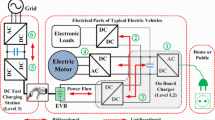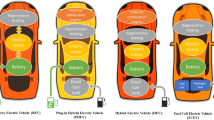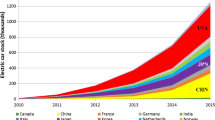Abstract
In this paper, a novel optimal bidding model through charging scheduling of Electric Vehicle (EV) cluster is proposed by considering the battery degradation to participate in the regulation market and energy market by considering Grid-to-Vehicle (G2V) and Vehicle-to-Grid (V2G) mode of operation. By utilizing the higher ramp rate of the EV battery, the participation of EV in performance-based frequency regulation (PBFR) is shown to enhance the profit incurred by parking lot operators (PLO). On the contrary, higher charging/discharging rate of EV battery due to the bidding in frequency regulation (FR) market may degrade the EV battery lifecycle. Hence, in this paper, an optimal bidding has been modeled by incorporating the above-mentioned challenges, which will enhance the PLOs revenue and as well as take care of the battery lifecycle of EV, by incorporating optimization techniques. Along with the bidding strategy, the cruising of EV is taken into contemplation and the cost of charging of EV is minimized. To handle the uncertainty of the EVs state of charge (SOC), 2 m-Point Estimation Method (2 m-PEM) is applied. It can be seen that the proposed algorithm is robust enough to earn revenue performing optimal bidding in power market.














Similar content being viewed by others
References
Rao V, Vizuete W. Particulates matter: impact, measurement, and remediation of airborne pollutants. Elsevier; 2020 Nov 28.
Deleanu S, et al. Optimal integration of electric vehicles in smart grid energy flow. In: Numerical methods for energy applications. Cham: Springer; 2021. p. 579–619. https://doi.org/10.1007/978-3-030-62191-9_22.
Trovato V. System scheduling with optimal time-varying delivery intervals for frequency response. IEEE Trans Power Syst. 2022;37(6):4270–85. https://doi.org/10.1109/TPWRS.2022.3150072.
Gulzari A, Wang Y, Prybutok V. A green experience with eco-friendly cars: a young consumer electric vehicle rental behavioral model. J Retail Consum Serv. 2022;65:102877. https://doi.org/10.1016/j.jretconser.2021.102877.
Frequency Regulation Compensation in the Organized Wholesale Power Markets, Dockets RM11-7-000 and AD10-11-000, U.S. Fed. Energy Reg. Comm., Washington, DC, USA, Oct. 2011. [Online]. Available: http://www.ferc.gov/whats-new/comm-meet/2011/102011/E-28.pdf.
Żywiołek J, Rosak-Szyrocka J, Khan MA, Sharif A. Trust in renewable energy as part of energy-saving knowledge. Energies. 2022;15(4):1566. https://doi.org/10.3390/en15041566.
Karfopoulos EL, Panourgias KA, Hatziargyriou ND. Distributed coordination of electric vehicles providing V2G regulation services. IEEE Trans Power Syst. 2015;31(4):2834–46. https://doi.org/10.1109/TPWRS.2015.2472957.
Mohamed MA, Jin T, Su W. An effective stochastic framework for smart coordinated operation of wind park and energy storage unit. Appl Energy. 2020;272:115228. https://doi.org/10.1016/j.apenergy.2020.115228.
Javed MS, Ma T, Jurasz J, Amin MY. Solar and wind power generation systems with pumped hydro storage: review and future perspectives. Renew Energy. 2020;1(148):176–92. https://doi.org/10.1016/j.renene.2019.11.157.
Lai CM, Teh J. Network topology optimisation based on dynamic thermal rating and battery storage systems for improved wind penetration and reliability. Appl Energy. 2022;305:117837. https://doi.org/10.1016/j.apenergy.2021.117837.
Gomez-Gonzalez M, Hernandez JC, Vera D, Jurado F. Optimal sizing and power schedule in PV household-prosumers for improving PV self-consumption and providing frequency containment reserve. Energy. 2020;191:116554. https://doi.org/10.1016/j.energy.2019.116554.
Lobato E, Sigrist L, Ortega A, González A, Fernández JM. Battery energy storage integration in wind farms: Economic viability in the Spanish market. Sustain Energy Grids Netw. 2022;32:100854. https://doi.org/10.1016/j.segan.2022.100854.
He G, Chen Q, Kang C, Pinson P, Xia Q. Optimal bidding strategy of battery storage in power markets considering performance-based regulation and battery cycle life. IEEE Trans Smart Grid. 2015;7(5):2359–67. https://doi.org/10.1109/TSG.2015.2424314.
Sadeghi S, Jahangir H, Vatandoust B, Golkar MA, Ahmadian A, Elkamel A. Optimal bidding strategy of a virtual power plant in day-ahead energy and frequency regulation markets: a deep learning-based approach. Int J Electr Power Energy Syst. 2021;127:106646. https://doi.org/10.1016/j.ijepes.2020.106646.
Germanà R, Liberati F, De Santis E, Giuseppi A, Delli Priscoli F, Di Giorgio A. Optimal control of plug-in electric vehicles charging for composition of frequency regulation services. Energies. 2021;14(23):7879. https://doi.org/10.3390/en14237879.
Habibifar R, Lekvan AA, Ehsan M. A risk-constrained decision support tool for EV aggregators participating in energy and frequency regulation markets. Electr Power Syst Res. 2020;185:106367. https://doi.org/10.1016/j.epsr.2020.106367.
Chau TK, Yu SS, Fernando T, Iu HH. Demand-side regulation provision from industrial loads integrated with solar PV panels and energy storage system for ancillary services. IEEE Trans Ind Inf. 2017;14(11):5038–49. https://doi.org/10.1109/TII.2017.2782244.
Kasturi K, Nayak CK, Nayak MR. Photovoltaic and electric vehicle-to-grid strategies for peak load shifting in low voltage distribution system under time of use grid pricing. Iran J Sci Technol Trans Electr Eng. 2021;45(3):789–801. https://doi.org/10.1007/s40998-020-00405-6.
La Fata A, Brignone M, Procopio R, Bracco S, Delfino F, Barilli R, Ravasi M, Zanellini F. An efficient Energy Management System for long term planning and real time scheduling of flexible polygeneration systems. Renew Energy. 2022;1(200):1180–201. https://doi.org/10.1016/j.renene.2022.10.030.
Yousefi-khangah B, Ghassemzadeh S, Hosseini SH, Mohammadi-Ivatloo B. Short-term scheduling problem in smart grid considering reliability improvement in bad weather conditions. IET Gener Transm Distrib. 2017;11(10):2521–33. https://doi.org/10.1049/iet-gtd.2016.1261.
Wu C, Sui Q, Lin X, Wang Z, Li Z. Scheduling of energy management based on battery logistics in pelagic islanded microgrid clusters. Int J Electr Power Energy Syst. 2021;127:106573. https://doi.org/10.1016/j.ijepes.2020.106573.
Bora B, Sastry OS, Kumar A, Renu, Bangar M, Prasad B. Estimation of most frequent conditions and performance evaluation of three photovoltaic technology modules. ASME J Sol Energy Eng. 2016;138(5):054504. https://doi.org/10.1115/1.4034202.
Das S, Acharjee P, Bhattacharya A. Coordinated charging scheduling for electric vehicles and optimal tuning of the controller for frequency regulation under uncertain environment. In: 2021 IEEE industry applications society annual meeting (IAS). IEEE; 2021. p. 1–6. https://doi.org/10.1109/IAS48185.2021.9677300
Elavarasan RM, Afridhis S, Vijayaraghavan RR, Subramaniam U, Nurunnabi M. SWOT analysis: a framework for comprehensive evaluation of drivers and barriers for renewable energy development in significant countries. Energy Rep. 2020;1(6):1838–64. https://doi.org/10.1016/j.egyr.2020.07.007.
Hannan MA, Wali SB, Ker PJ, Abd Rahman MS, Mansor M, Ramachandaramurthy VK, Muttaqi KM, Mahlia TM, Dong ZY. Battery energy-storage system: a review of technologies, optimization objectives, constraints, approaches, and outstanding issues. J Energy Storage. 2021;42:103023. https://doi.org/10.1016/j.est.2021.103023.
Sahraei-Ardakani M, Blumsack S, Kleit A. Distributional impacts of state-level energy efficiency policies in regional electricity markets. Energy Policy. 2012;1(49):365–72. https://doi.org/10.1016/j.enpol.2012.06.034.
Meng J, Mu Y, Jia H, Wu J, Yu X, Qu B. Dynamic frequency response from electric vehicles considering traveling behavior in the Great Britain power system. Appl Energy. 2016;15(162):966–79. https://doi.org/10.1016/j.apenergy.2015.10.159.
Performance Based Regulation: Year One Analysis, PJM, Valley Forge; 2013.
Das S, Acharjee P, Bhattacharya A. Charging scheduling of electric vehicle incorporating grid-to-vehicle and vehicle-to-grid technology considering in smart grid. IEEE Trans Ind Appl. 2021;57(2):1688–702. https://doi.org/10.1109/TIA.2020.3041808.
Abdel-Mawgoud H, Kamel S, Khasanov M, Khurshaid T. A strategy for PV and BESS allocation considering uncertainty based on a modified Henry gas solubility optimizer. Electr Power Syst Res. 2021;191:106886. https://doi.org/10.1016/j.epsr.2020.106886.
Das D, Bhattacharya A, Ray RN. Dragonfly algorithm for solving probabilistic economic load dispatch problems. Neural Comput Applic. 2020;32:3029–45. https://doi.org/10.1007/s00521-019-04268-9.
Choi H, Lim NG, Lee SJ, Park J. Feasibility study for sustainable use of lithium-ion batteries considering different positive electrode active materials under various driving cycles by using cell to electric vehicle (EV) simulation. Sustainability. 2020;12(22):9764. https://doi.org/10.3390/su12229764.
Gunen MA, Besdok E, Civicioglu P, Atasever UH. Camera calibration by using weighted differential evolution algorithm: a comparative study with ABC, PSO, COBIDE, DE, CS, GWO, TLBO, MVMO, FOA, LSHADE, ZHANG and BOUGUET. Neural Comput Appl. 2020;32(23):17681–701. https://doi.org/10.1007/s00521-020-04944-1.
Funding
There are no funding agencies related to this work.
Author information
Authors and Affiliations
Corresponding author
Ethics declarations
Conflict of Interest
On behalf of all authors, the corresponding author states that there is no conflict of interest. Sourav Das declares that he has no conflict of interest. Parimal Acharjee declares that he has no conflict of interest. Aniruddha Bhattacharya declares that he has no conflict of interest.
Ethical Approval
This article does not contain any studies with human participants or animals performed by any of the authors.
Informed Consent
Informed consent was obtained from all individual participants included in the study.
Additional information
Publisher's Note
Springer Nature remains neutral with regard to jurisdictional claims in published maps and institutional affiliations.
This article is part of the topical collection “Enabling Innovative Computational Intelligence Technologies for IOT” guest edited by Omer Rana, Rajiv Misra, Alexander Pfeiffer, Luigi Troiano and Nishtha Kesswani.
Rights and permissions
Springer Nature or its licensor (e.g. a society or other partner) holds exclusive rights to this article under a publishing agreement with the author(s) or other rightsholder(s); author self-archiving of the accepted manuscript version of this article is solely governed by the terms of such publishing agreement and applicable law.
About this article
Cite this article
Das, S., Acharjee, P. & Bhattacharya, A. Frequency Regulation-Based Optimal Charging Scheduling of EV Clusters Based on Strategical Bidding in Power Market. SN COMPUT. SCI. 4, 591 (2023). https://doi.org/10.1007/s42979-023-02012-8
Received:
Accepted:
Published:
DOI: https://doi.org/10.1007/s42979-023-02012-8




